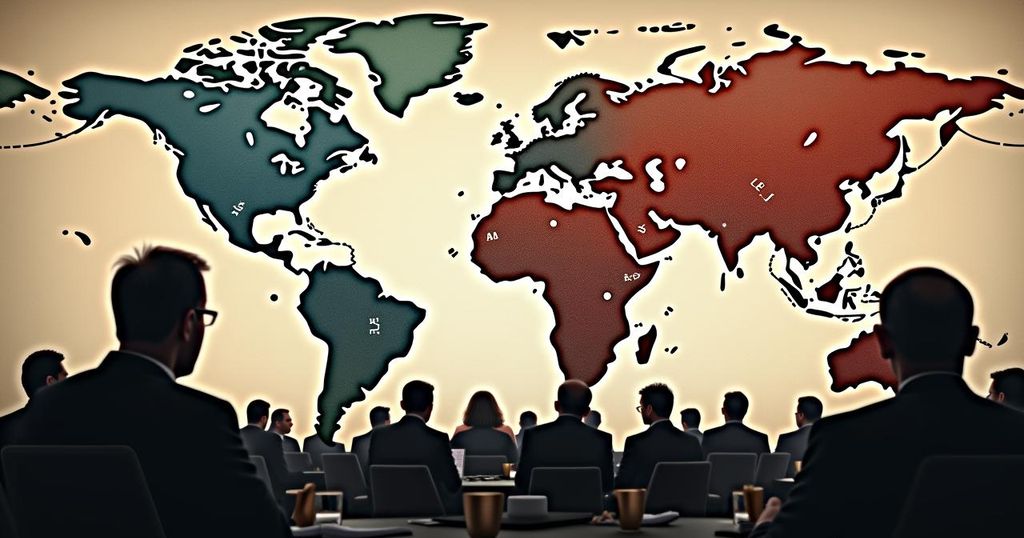Netanyahu’s UN Address: An Omission of Palestine and a Focus on Regional Alliances
Israeli Prime Minister Benjamin Netanyahu presented two maps at the UN General Assembly, both devoid of any reference to Palestine. He labeled countries influenced by Iran as “The Curse” and those allied or potential allies to Israel as “The Blessing.” His discourse emphasized Iranian influence as a source of regional conflict while projecting optimism regarding future normalization with key nations such as Saudi Arabia.
At the United Nations General Assembly in New York, Israeli Prime Minister Benjamin Netanyahu presented two maps that starkly omitted any mention of Palestine. In his right hand, he displayed a map labeled “The Curse,” depicting Middle Eastern nations such as Iran, Iraq, Syria, and Yemen in black. Meanwhile, in his left hand was a map titled “The Blessing,” illustrating countries including Egypt, Sudan, Saudi Arabia, and India painted in green. Both maps shared one crucial detail: the total absence of Palestine. Netanyahu asserted a direct connection between the nations represented in “The Curse” and Iranian influence, arguing that the ongoing conflicts in the region stem from Iran and its allies’ actions. He pointed to Iran’s financial and military support for groups like Hezbollah in Lebanon and Hamas in Gaza as catalysts for instability. “As long as Hezbollah chooses the path of war, Israel has no choice but to remove this threat,” he stated during his presentation, emphasizing Israel’s right to defend itself against Iranian-backed aggressions. When addressing the map depicted as “The Blessing,” Netanyahu highlighted regional allies or potential allies who have either normalized relations with Israel or are on the path to do so. This included Saudi Arabia, whose participation in the map hinted at Netanyahu’s hope for future normalization discussions, despite Saudi Arabia’s insistence that any normalization must be contingent upon the establishment of a Palestinian state. Egypt and Sudan also figured prominently on the map, reflecting their existing or newly forged ties with Israel rather than reflecting a peaceful resolution of the Israeli-Palestinian conflict. Netanyahu’s discourse at the UN was punctuated by a warning to Iran regarding military engagements, stating, “If you strike us, we will strike you,” purposes echoing Israel’s military posture in the region. The assembly witnessed significant walkouts from diplomats in response to his statements. In this context, the mappings presented serve to illustrate the current geopolitical dynamics within the Middle East, as well as to underscore Israel’s strategic interests amidst enduring conflicts and emerging alliances.
The geopolitical landscape of the Middle East remains complex and fraught with historical tensions, particularly concerning the Israeli-Palestinian conflict. Prime Minister Netanyahu’s recent address at the United Nations indicated a strategic emphasis on regional alliances, particularly against the backdrop of Iranian influence, which he perceives as destabilizing. His maps serve as a visualization of his perspective on both adversaries and allies within the region, illustrating Israel’s ongoing diplomatic and military strategies. The omission of Palestine in this discourse signals a broader narrative where international dialogues often overshadow Palestinian statehood, further complicating peace efforts in the region.
Netanyahu’s presentation at the UN, characterized by his dual maps, underscores Israel’s evolving relationships in the Middle East while highlighting the persistent exclusion of Palestine from the discussion. By framing nations in green as allies or potential allies, he demonstrates a clear strategy to juxtapose perceived threats from the Iranian sphere against cooperative regional relationships. This portrayal not only reflects Israel’s military and diplomatic strategies but also raises pressing questions about the future of Palestinian statehood and the complexities of Middle Eastern diplomacy.
Original Source: www.ndtv.com




Post Comment